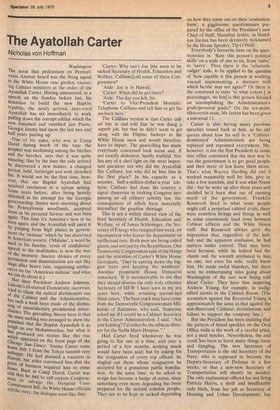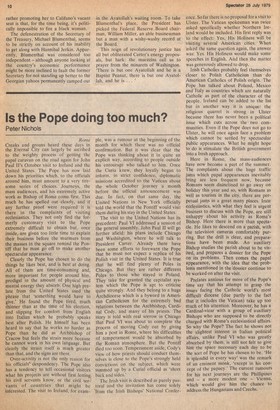The Ayatollah Carter
Nicholas von Hoffman
Washington The noise that pedestrians on Pennsylvania Avenue heard was the firing squad in the White House rose garden, executing Cabinet ministers at the order of the Ayatollah Carter. Having announced, in a Speech on the Sunday before last, his intention to build the new Baptist republic, the newly arrived, laser-eyed Ayatollah has set immediately to work Pulling down the corrupt edifice which the now banished and vanished just Plains, Georgia Jimmy had spent the last two and half years putting up.
One of his aides, who was at Camp David during much of the time the Prophet was meditating among the birches and the beeches, says that it was quite amazing: that by the time the aide arrived he discovered a new mister, a changed Person, bold, forthright and with clenched fist. It would not be the first time, however, that our Baptist Ayatollah had received revelation in a sylvan setting. Some years before, after being heavily defeated in his attempt for the Georgia governorship, Jimmy went mooning about the Pennsylvania woodlands, accepted Jesus as his personal Saviour and was born again. This time it's America's turn to be born again, and the Ayatollah will assist it by purging from high places in government the 'malaise' which he has discerned in American society, ('Malaise', a word he used in his Sunday 'crisis of confidence' Speech to the multitudes, is now the mot of the moment. Sineere divines of every Persuasion and denomination are out like Slugs after heavy rain, organising conferences on the 'American malaise' and what we can do about it.) Not since President Andrew Johnson, Lincoln's ill-starred Democratic successor, tried to chase the radical abolitionists out of the Cabinet and the Administration, has such a hash been made of the dismissing of unsatisfactory presidential subordinates. The prevailing theory here is that the mass sacking was arranged to show the Populace that the Baptist Ayatollah is as tough as any Mohammedan, but what it has produced are stories like this one Which appeared on the front page of the Chihome cago Sun-Times: 'Jimmy Carter came July 1 from the Tokyo summit very uunaapPy. He had planned a vacation in Hawaii, but aides convinced him that the Press of business required him to come ,onh.tne. Back at Camp David, Carter was told that he had to call certain Congressnil _en to salvage the Hospital CostContainment Bill. As White House officials tell the story, the dialogue went like this: 'Carter: Why can't Joe [the soon to be sacked Secretary of Health, Education and Welfare, Califano] call some of these Congressmen?
'Aide: .Joe is in Hawaii.
'Carter: When did he get there?
'Aide: The day you left, Sir.
'Carter to Vice-President Mondale: Telephone Califano and tell him to get his ass back here.'
The Califano version is that Carter called him in and told him he was doing a superb job, but that he didn't seem to get along with the Filipino busboys in the White House mess and would therefore have to depart. The quarrelling has made everybody concerned look mean and, if not exactly dishonest, hardly truthful. Nor has any of it shed light on the most important question: not why did the Ayatollah fire Califano, but why did he hire him in the first place? In his. capacity as a smarmy, half-a-million-dollar-a-year lobbyist, Califano had done his country a signal disservice in tricking Congress into passing an oil refinery subsidy law, the consequences of which have materially intensified the gasoline shortage.
This is not a widely shared view of the fired Secretary of Health, Education and Welfare, or of James Schlesinger, the Secretary of Energy who resigned last week, an incompetent who leaves his department an ineffectual ruin. Both men are being called giants, and not just by the Republicans. One Democratic Congressman said of the firings and the retention of Carter's White House Georgians, 'They're cutting down the biggest trees and keeping the monkeys.' Another prominent House Democrat remarked, 'It is inconceivable to me that they should dismiss the only truly effective Secretary of HEW I have seen in my ten years here, while retaining second-and third-raters.' The best crack may have come from the Democratic Congresswoman Milkulski of Baltimore, who said, 'Someone asked me if I would be a Cabinet Secretary in the Carter Administration. I said, "Are you kidding? l'clrather be the athletic director for the Stella Mans Hospice." ' Had Carter fired whomever he was going to fire one at a time, and over a period of a few months, nothing much would have been said; but by asking for the resignation of every top official, he singled out those whose resignation he accepted for a gratuitous public humiliation. At the same time, to be asked to resign has become a badge of status, since something even more degrading has been prepared for the second echelon people. They are to be kept or sacked depending on how they come out on their 'evaluation form', a gigglesome questionnaire prepared by the office of the President's new Chief of Staff, Hannibal Jerkin, as Hamilton Jordan has been derisively nicknamed by the House Speaker, Tip O'Neill. Everybody's favourite item on the questionnaire is: 'Rate this person's political skills' on a scale of one to six, from 'naive' to 'savvy'. Then there is the 'reluctantcadger' scale, to be applied to the question of 'how capable is this person at working toward implementing a decision with which he/she may not agree?' Or there is the command to state `to what extent [ in percentages, no less] is this person focused on accomplishing the Administration's goals/personal goals?' On the ten-point, idiot-cretin scale, Mr Jerkin has been given a universal 11.
Carter is also having many previous speeches tossed back at him, as his old quotes about how his will be a 'Cabinetdominated' Administration are being replayed and reprinted everywhere. He, however, is not the first President to come into office convinced that the best way to run the government is to get good people and then more or less leave them alone. That's what Warren Harding did and it worked reasonably well for him, give or take a few scandals, and it was what Nixon did — but he woke up after three years and decided he'd been shut out of running much of the government. Franklin Roosevelt lived in what some people might call a perpetual cabinet crisis; there were countless hirings and firings as well as some enormously loud rows between Cabinet officers and the White House staff. But Roosevelt always gave the impression that, regardless of the hubbub and the apparent confusion, he had matters under control. That may have been because, while he indeed had the charm and the warmth attributed to him, no one, not even his wife, really knew him. He made awful blunders, but there were no embarrassing tales going about Washington of the sort now being told about Carter. They have him carpeting Andrew Young, for example, in undignified scenes in the Cabinet Room. (The accusation against the Reverend Young is approximately the same as that against the non-Re,verend Califano: deviationism and failure to support the company line.) But the President has been insisting that the pattern of blood speckles on the Oval Office walls is the work of a careful artist, not a mad butcher. Nevertheless, the end result has been to leave many things loose and dangling. The new Secretary of Transportation is the old Secretary of the Navy, who is supposed to become the .Deputy-Secretary of Defense in a few weeks, so that a new-new Secretary of Transportation will shortly be needed.
The only explanation offered for not firing Patricia Harris, a shrill and insufferably rude bitch, from her job as Secretary of Housing and Urban Development, but rather promoting her to Califano's vacant seat is that, for the time being, it's politically impossible to fire a black woman.
The defenestration of the Secretary of the Treasury, Michael Blumenthal, seems to be strictly on account of his inability to get along with Hannibal Jerkin. Apparently, Blumenthal was considered too independent — although anyone looking at the country's economic performance might be more inclined to fault the former Secretary for not standing up better to the Georgian yahoos permanently camped out in the Ayatollah's waiting room. To take Blumenthal's place, the President has picked the Federal Reserve Board chairman, William Miller, an able businessman but a man with a wishy-washy record at the Board.
This reign of revolutionary justice has all but obliterated Carter's energy proposals, but hark: the muezzins call us to prayer from the minarets of Washington. 'There is but one Ayatollah and he is a Baptist Peanut, there is but one Ayatollah, and he is







































 Previous page
Previous page